备考2011高效学习方案英语高一册:unit 16 scientists at work
文档属性
| 名称 | 备考2011高效学习方案英语高一册:unit 16 scientists at work | 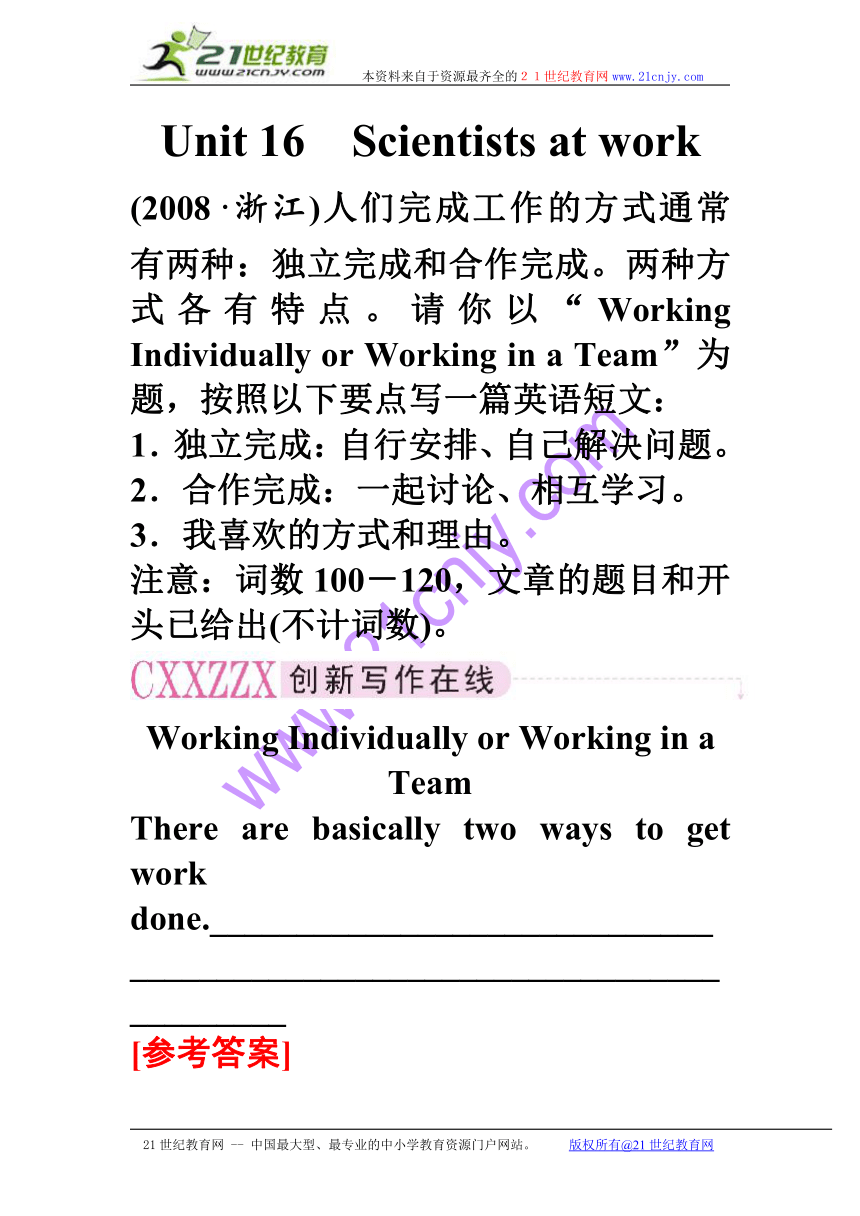 | |
| 格式 | rar | ||
| 文件大小 | 144.5KB | ||
| 资源类型 | 教案 | ||
| 版本资源 | 人教版 | ||
| 科目 | 英语 | ||
| 更新时间 | 2010-12-14 17:11:00 | ||
图片预览

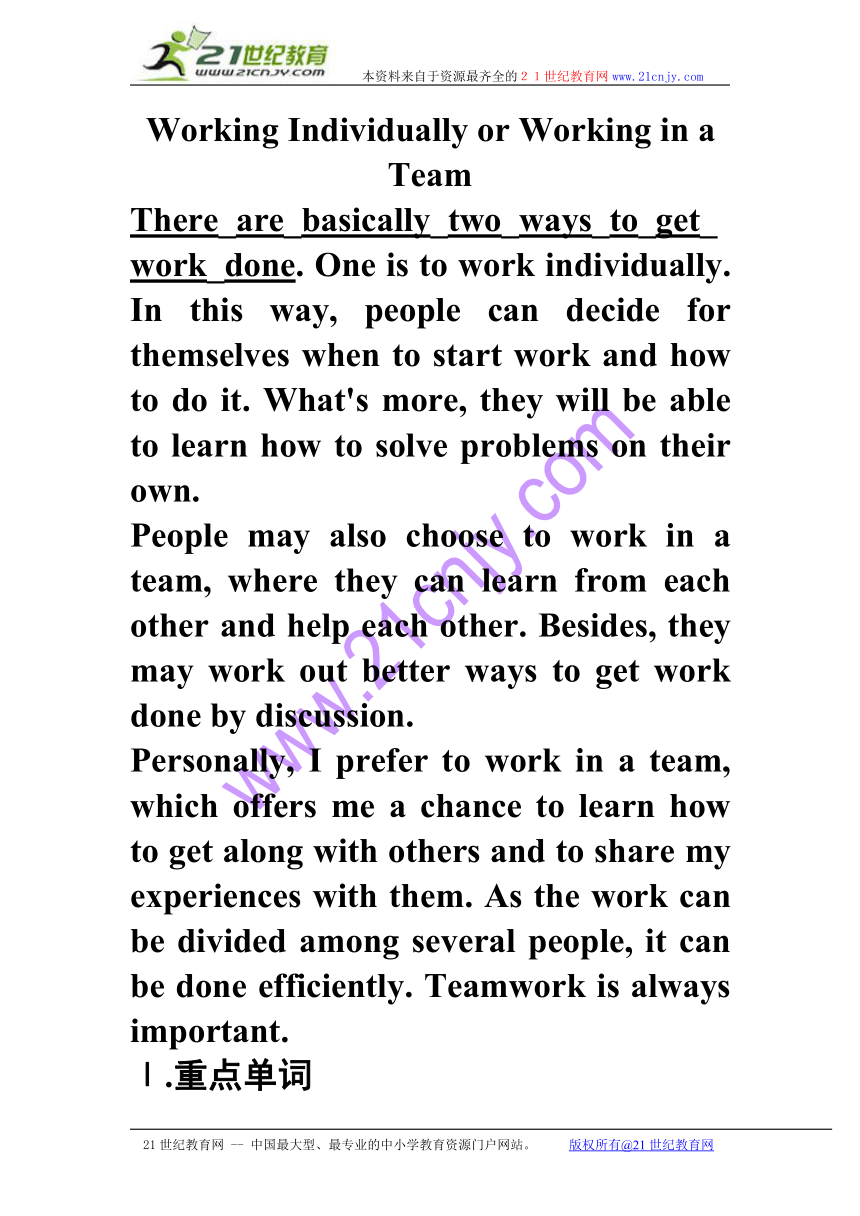
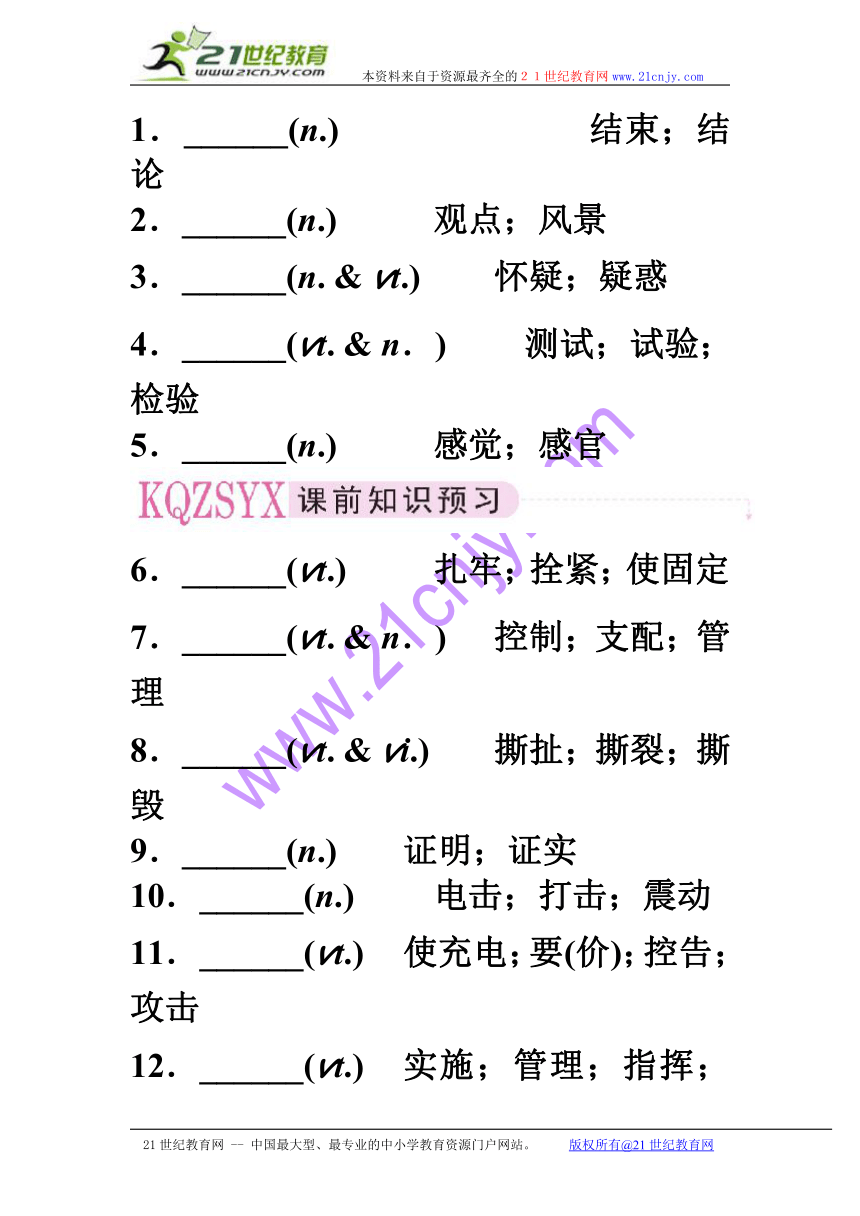
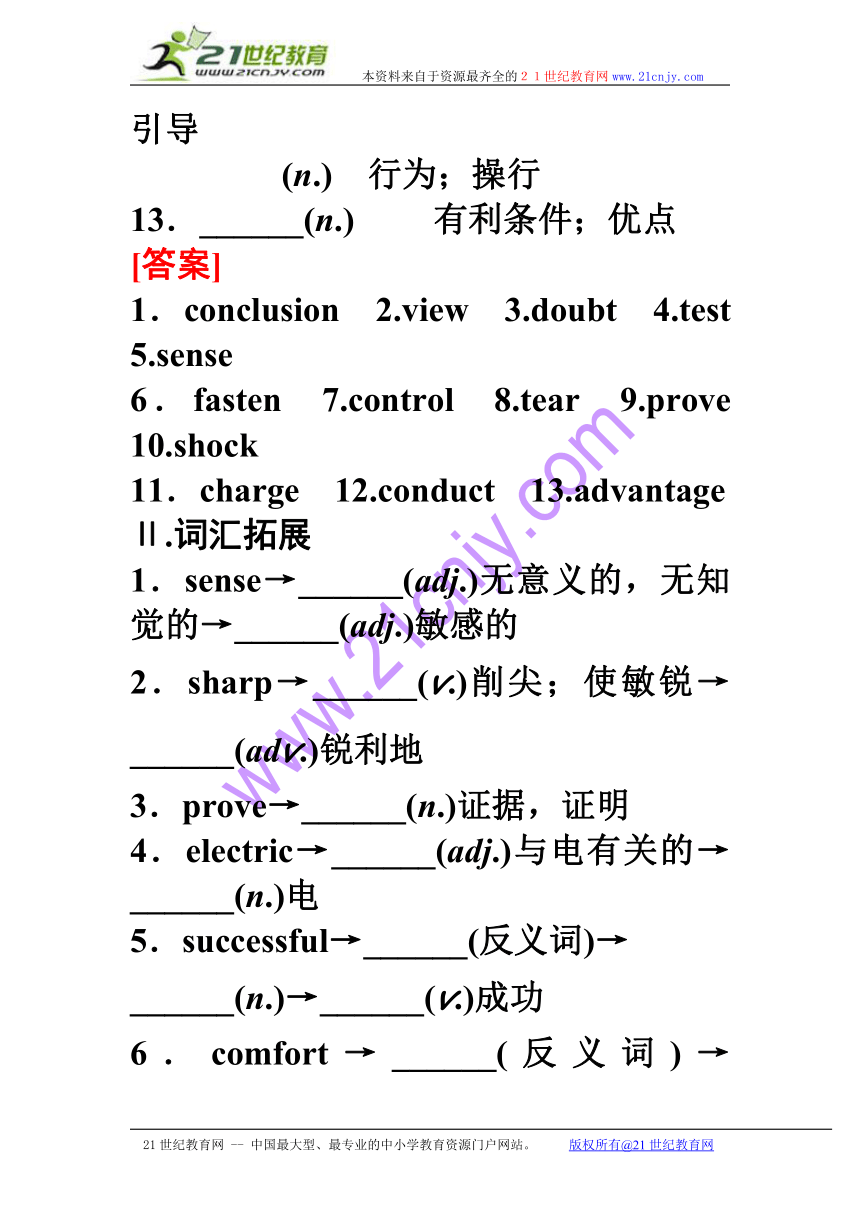
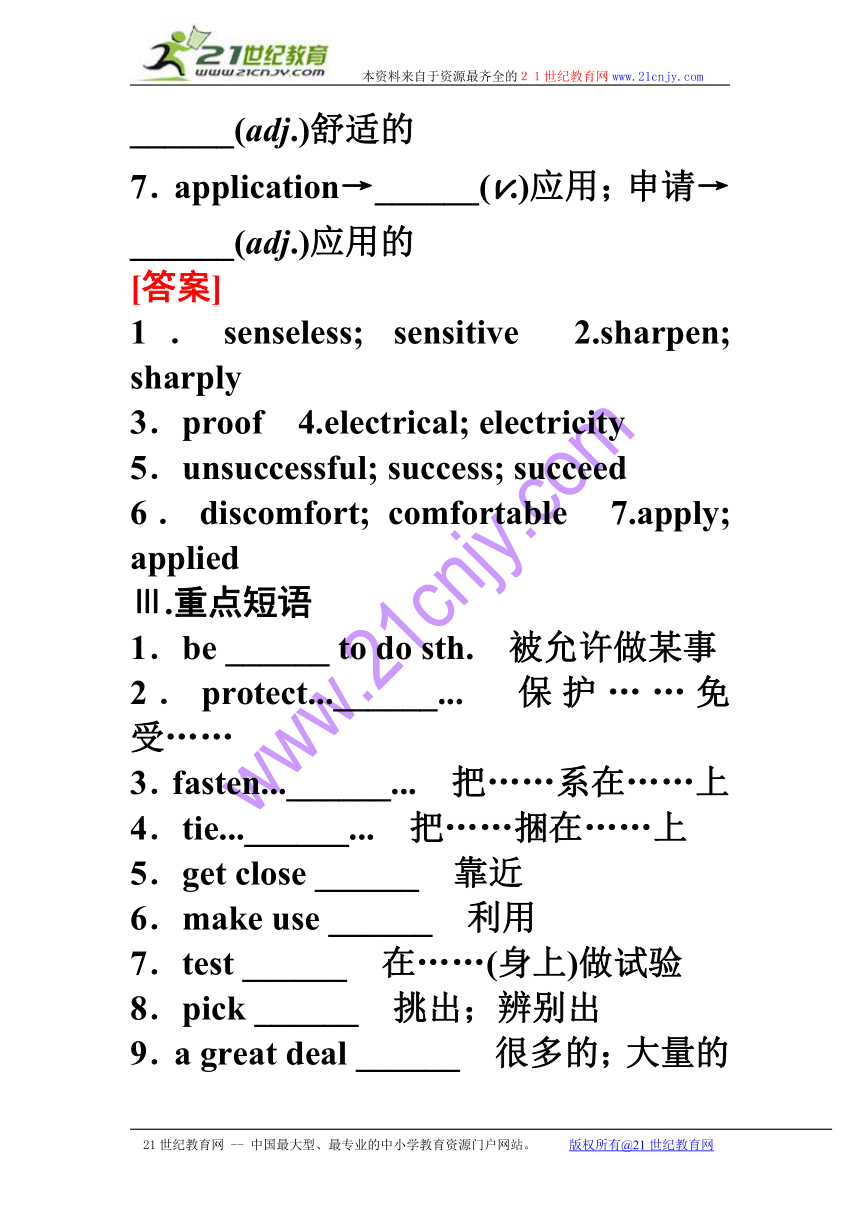
文档简介
本资料来自于资源最齐全的21世纪教育网www.21cnjy.com
Unit 16 Scientists at work
(2008·浙江)人们完成工作的方式通常有两种:独立完成和合作完成。两种方式各有特点。请你以“Working Individually or Working in a Team”为题,按照以下要点写一篇英语短文:
1.独立完成:自行安排、自己解决问题。
2.合作完成:一起讨论、相互学习。
3.我喜欢的方式和理由。
注意:词数100-120,文章的题目和开头已给出(不计词数)。
Working Individually or Working in a Team
There are basically two ways to get work done.________________________________________________________________________
[参考答案]
Working Individually or Working in a Team
There_are_basically_two_ways_to_get_work_done. One is to work individually. In this way, people can decide for themselves when to start work and how to do it. What's more, they will be able to learn how to solve problems on their own.
People may also choose to work in a team, where they can learn from each other and help each other. Besides, they may work out better ways to get work done by discussion.
Personally, I prefer to work in a team, which offers me a chance to learn how to get along with others and to share my experiences with them. As the work can be divided among several people, it can be done efficiently. Teamwork is always important.
Ⅰ.重点单词
1.______(n.) 结束;结论
2.______(n.) 观点;风景
3.______(n. & vt.) 怀疑;疑惑
4.______(vt. & n.) 测试;试验;检验
5.______(n.) 感觉;感官
6.______(vt.) 扎牢;拴紧;使固定
7.______(vt. & n.) 控制;支配;管理
8.______(vt. & vi.) 撕扯;撕裂;撕毁
9.______(n.) 证明;证实
10.______(n.) 电击;打击;震动
11.______(vt.) 使充电;要(价);控告;攻击
12.______(vt.) 实施;管理;指挥;引导
(n.) 行为;操行
13.______(n.) 有利条件;优点
[答案]
1.conclusion 2.view 3.doubt 4.test 5.sense
6.fasten 7.control 8.tear 9.prove 10.shock
11.charge 12.conduct 13.advantage
Ⅱ.词汇拓展
1.sense→______(adj.)无意义的,无知觉的→______(adj.)敏感的
2.sharp→______(v.)削尖;使敏锐→______(adv.)锐利地
3.prove→______(n.)证据,证明
4.electric→______(adj.)与电有关的→______(n.)电
5.successful→______(反义词)→______(n.)→______(v.)成功
6.comfort→______(反义词)→______(adj.)舒适的
7.application→______(v.)应用;申请→______(adj.)应用的
[答案]
1.senseless; sensitive 2.sharpen; sharply
3.proof 4.electrical; electricity
5.unsuccessful; success; succeed
6.discomfort; comfortable 7.apply; applied
Ⅲ.重点短语
1.be ______ to do sth. 被允许做某事
2.protect...______... 保护……免受……
3.fasten...______... 把……系在……上
4.tie...______... 把……捆在……上
5.get close ______ 靠近
6.make use ______ 利用
7.test ______ 在……(身上)做试验
8.pick ______ 挑出;辨别出
9.a great deal ______ 很多的;大量的
10.a number ______ 若干;一些
[答案]
1.allowed 2.from 3.to 4.to 5.to 6.of
7.on 9.out 9.of 10.of
Ⅳ.重点句型
1.Tie the corners of the handkerchief to the points of the cross, and you will have a nice strong kite.
把手绢的几个角与成十字形的木条的四个顶端系在一起,这样,一个既好看又结实的风筝就做成了。
2.There is a high chance that...很有可能……
3.There is no doubt that...毫无疑问……
Ⅴ.重点语法
Word Formation(构词法)
Ⅰ.词汇聚焦
1.comfort n. 舒适;安慰; v. 安慰
[思维拓展]
to live in comfort生活舒适
be a comfort to sb.对某人来说是个安慰
comfort sb.安慰某人
discomfort n. 不舒适;不自在
comfortable adj. 舒适的;愉快的
uncomfortable adj. 不舒适的;不自在的
My husband was a great ______ to me when I was ill.
A. courage B. encouraging
C. comfort D. comfortable
解析:该题考查词义辨析:courage“勇敢;胆量”;encouraging adj. “有勇气的”;comfortable adj. “舒适的”;a comfort to sb.“对某人来说是安慰”。
答案:C
2.conduct v. 引导;指挥;进行;传导
[思维拓展]
conduct sb. around...带领某人参观……
conduct sb. in/out/to the door领某人进/出/到门口
conduct state affairs处理国事
conduct water uphill引水上山
conduct electricity导电
conduct oneself (=behave oneself)表现,举止
3.charge v. 使充电;要价;控告;攻击
[思维拓展]
①charge vt. 使承担(任务,责任);要价,索价;vi. 要价
charge sb. with sth./doing sth.使某人承担……责任
charge sb. money for sth./doing sth.
向某人索价多少钱干什么
charge for...为……收取费用
②charge n. 价钱;管理;指控
sb. be in charge of sth.某人负责(掌管)某事
sth. be in the charge of sb.某事在某人的掌管之下
take charge of sth.负责,管理(某事)
bring a charge of sth. against sb.
控告某人(某项罪名)
The manager has to go on a business trip. His company will be left in ______ of his secretary.
A. charge B. the charge
C. need D. place
解析:sth. be left in the charge of sb.“某物被留下来由某人管理/负责”。又如:The child was left in the charge of the nurse.孩子被留了下来,由保姆照看。in need of...“(主语)需要……”。
答案:B
4.waste是不可数名词,“浪费”(可与a连用,构成a waste of)
[思维拓展]
a waste of time/money/materials...
浪费时间/金钱/材料……
waste time/money on sth.
在……上浪费时间/金钱
waste time/money (in) doing sth.
浪费时间/金钱干……
[指点迷津]
常用It’s a waste of...结构。
It’s no use ______ time ______ that matter.
A. wasting; discussing
B. to waste; to discuss
C. wasting; to discuss
D. to waste; discussing
解析:It’s no use doing sth.“干……没用”是固定结构,waste time (in) doing sth.“浪费时间干……”。根据这两个结构不难看出,应选A,discussing前省略了in。
答案:A
5.application n. 应用;申请;用功
[思维拓展]
make an application for the job提出求职申请
work with great application努力学习
apply v. 申请;应用;涂抹;努力
apply for the job提出工作申请
apply sth. to sth.把……抹到……
apply oneself to sth.专心于……
6.experiment n. 实验;试验; v. 做实验
[思维拓展]
experiment with...用……做实验
7.prove v. 证明;证实
[思维拓展]
prove+n.证明……
prove one’s honesty/courage证明某人的诚实/勇气
prove sb. (to be)+n./adj. 证明某人是……
prove sb. to be an honest man/honest
证明某人是诚实的
prove+从句 证明;证实
As it happened, my advice ______ to be wrong.
A. proved B. proves
C. was proved D. prove
解析:B、D项时态或数的形式不合适;prove后接to be+adj./n.结构时一般不用被动语态。
答案:A
8.advantage n. 有利条件;优点;优势
[思维拓展]
have (gain, win) an advantage over占(获得)优势
have the advantage of sb.较某人有利,比某人强
take advantage of sb.欺骗某人
take (full) advantage of sth.(充分)利用某事物
be to sb.’s advantage对某人有利,有助于某人
to advantage更加地,越发有效地
disadvantage n. 不利的条件,不利之处,劣势
He received much ______ from reading good novels, and his fluency in the English language gives him ______ the other candidate for the job.
A. advantage; an advantage to
B. benefit; an advantage over
C. benefit; the benefit of
D. advantage; a benefit to
解析:advantage指物质利益及竞争中所占的优势或有利地位;benefit是“利益,益处”的常用词,可兼指物质利益或精神利益的好处,因此一空应选benefit(读优秀小说使他受益匪浅)。二空为动词短语,give sb. an advantage over sb. else“给某人胜过他人的有利条件”;give sb. the benefit of sth.意为“为某人的……行为作善意解释”。由题意“他那流利的英语使他有了胜过另一位求职者的有利条件”,可知答案。
答案:B
9.shock n. 电击;打击;震动
[思维拓展]
shock n. (相撞、爆炸等引起的)撞击震动,(精神上的)打击,震惊
a great shock to sb.给某人很大的震惊/震撼
get a shock from a wire碰着电线而触电
recover from the shock of...从……震惊中恢复
three shocks of the earthquakes三次地震
shock v. 使震动;使震惊
sth. shock sb.某事使某人震惊
sb. be shocked by/at sth.某人对……感到震惊
______ by his death, his wife was determined ______ on working.
A. Deeply shocked; to go
B. Deeply shocked; on going
C. Shocked deeply; to go
D. Shocked deeply; on going
解析:shock为及物动词,相当于surprise,“感到非常震惊”应用be deeply shocked/surprised,副词修饰v.-ed分词;二空“决心做某事”be determined to do sth., determine用作不及物动词时,可用于determine on/upon sth./doing sth.。
答案:A
Ⅱ.短语突破
1.a number of若干;一些
a great deal of很多的;大量的
[思维拓展]
①a number of用于修饰可数名词复数形式,“许多的”,修饰主语,谓语动词用复数形式。
②the number of后接名词或代词,“……的数目”,作主语时谓语动词用单数形式。
③a geat deal of用于修饰不可数名词,“大量的”,修饰主语时谓语动词用单数形式。
④a great deal可用作副词短语,修饰形容词、副词;也可用于修饰比较级形式,“大量的;许多的”。
We all think ______ of his books, so many of us bought one each.
A. a large number B. a great many
C. a large amount D. a great deal
解析:本题考查think...of这一短语的用法,由题意看出,我们对他的书评价很高,所以很多人都买了一本。此处用a great deal,相当于much或well,而其他短语表达不出所需意义。
答案:D
2.be careful当心
[思维拓展]
be careful about/of注意……,当心……
be careful with做……认真,注意……
be careful not to do sth.当心不要……
be careful as to+从句 对于……谨慎
be careful in (doing) sth.在……方面谨慎
be careful+从句 注意……,当心……
be careful doing sth.做某事时要当心
It is careless of sb. to do sth.=Sb. is careless to do sth.某人做……太粗心了。
Ⅲ.句型归纳
1.Animal testing has helped to develop medicines against many diseases.动物试验帮助研制了治疗许多疾病的药物。
[思维拓展]
can’t help doing sth.禁不住做某事
be a great help=be of great help=be very helpful很有帮助
I’m afraid I can’t help ______ the house, Mum. I have a lot of homework to do.
A. clean B. cleaning
C. cleaned D. to be cleaning
解析:“恐怕我不能帮着打扫房间了”。由句意可知,该句考查help作“帮忙”之意,用help (sb.) (to) do sth.结构,can’t help doing sth.“禁不住做……;情不自禁做……”。
答案:A
2.Tie the corners of the handkerchief to the points of the cross, and you will have a nice strong kite.系手帕的一角到十字架的一点,那么你就有一个坚固的风筝了。
[思维拓展]
①祈使句+and+陈述句
Work hard, and you’ll get good marks.
(=If you work hard, you’ll get good marks.)
②名词短语+and+陈述句
One more step, and I’d beat you flat.
(=If you took one more step, I would beat you flat.)
③祈使句+or (else)+陈述句
Hurry up, or (else) we’ll be late for school.
(=If we don’t hurry up, we’ll be late for school.)
Turn on a television or open a magazine and you ______ advertisement showing happy families.
A. will often see B. often see
C. are often seeing D. have often seen
解析:“祈使句+and/or+陈述句”是一种常见句型,陈述句中一般使用一般将来时态。
答案:A
3.Take care that the string does not touch the wall or the door.当心别让风筝线碰到墙或门。
take care还可单独使用,意为“当心”,相当于look out, watch out, be careful。
Who ______ the baby while the mother is out Which of the following answers is wrong
A. looks after B. takes care of
C. cares for D. looks for
解析:look after, take care of, care for都可表“照顾”之意,look for“寻找”。
答案:D
4.Fly the kite when a thunderstorm appears to be coming on.在雷暴雨看起来就要开始的时候放飞风筝。
[指点迷津]
①appear在此为系动词,意为“看起来”,其后可跟形容词、不定式作其表语,还可用于It appears that...句型(其用法基本与seem相同)。
②come on表示“(夜幕等)降临,到来,(灯)开着”“开始”,也可表示“进行,进展;成长;上演”等。
[注]①come on还可用来表示“快点吧(不要犹豫了)”;“加油;加把劲”。
如:Come on, Jim. Get this letter typed.
Come on! We don’t have much time.
②come on还可用来表示“(知道某人所说的话不正确)得了吧”。如:Oh, come on—you know that isn’t true!
21世纪教育网 -- 中国最大型、最专业的中小学教育资源门户网站。 版权所有@21世纪教育网
Unit 16 Scientists at work
(2008·浙江)人们完成工作的方式通常有两种:独立完成和合作完成。两种方式各有特点。请你以“Working Individually or Working in a Team”为题,按照以下要点写一篇英语短文:
1.独立完成:自行安排、自己解决问题。
2.合作完成:一起讨论、相互学习。
3.我喜欢的方式和理由。
注意:词数100-120,文章的题目和开头已给出(不计词数)。
Working Individually or Working in a Team
There are basically two ways to get work done.________________________________________________________________________
[参考答案]
Working Individually or Working in a Team
There_are_basically_two_ways_to_get_work_done. One is to work individually. In this way, people can decide for themselves when to start work and how to do it. What's more, they will be able to learn how to solve problems on their own.
People may also choose to work in a team, where they can learn from each other and help each other. Besides, they may work out better ways to get work done by discussion.
Personally, I prefer to work in a team, which offers me a chance to learn how to get along with others and to share my experiences with them. As the work can be divided among several people, it can be done efficiently. Teamwork is always important.
Ⅰ.重点单词
1.______(n.) 结束;结论
2.______(n.) 观点;风景
3.______(n. & vt.) 怀疑;疑惑
4.______(vt. & n.) 测试;试验;检验
5.______(n.) 感觉;感官
6.______(vt.) 扎牢;拴紧;使固定
7.______(vt. & n.) 控制;支配;管理
8.______(vt. & vi.) 撕扯;撕裂;撕毁
9.______(n.) 证明;证实
10.______(n.) 电击;打击;震动
11.______(vt.) 使充电;要(价);控告;攻击
12.______(vt.) 实施;管理;指挥;引导
(n.) 行为;操行
13.______(n.) 有利条件;优点
[答案]
1.conclusion 2.view 3.doubt 4.test 5.sense
6.fasten 7.control 8.tear 9.prove 10.shock
11.charge 12.conduct 13.advantage
Ⅱ.词汇拓展
1.sense→______(adj.)无意义的,无知觉的→______(adj.)敏感的
2.sharp→______(v.)削尖;使敏锐→______(adv.)锐利地
3.prove→______(n.)证据,证明
4.electric→______(adj.)与电有关的→______(n.)电
5.successful→______(反义词)→______(n.)→______(v.)成功
6.comfort→______(反义词)→______(adj.)舒适的
7.application→______(v.)应用;申请→______(adj.)应用的
[答案]
1.senseless; sensitive 2.sharpen; sharply
3.proof 4.electrical; electricity
5.unsuccessful; success; succeed
6.discomfort; comfortable 7.apply; applied
Ⅲ.重点短语
1.be ______ to do sth. 被允许做某事
2.protect...______... 保护……免受……
3.fasten...______... 把……系在……上
4.tie...______... 把……捆在……上
5.get close ______ 靠近
6.make use ______ 利用
7.test ______ 在……(身上)做试验
8.pick ______ 挑出;辨别出
9.a great deal ______ 很多的;大量的
10.a number ______ 若干;一些
[答案]
1.allowed 2.from 3.to 4.to 5.to 6.of
7.on 9.out 9.of 10.of
Ⅳ.重点句型
1.Tie the corners of the handkerchief to the points of the cross, and you will have a nice strong kite.
把手绢的几个角与成十字形的木条的四个顶端系在一起,这样,一个既好看又结实的风筝就做成了。
2.There is a high chance that...很有可能……
3.There is no doubt that...毫无疑问……
Ⅴ.重点语法
Word Formation(构词法)
Ⅰ.词汇聚焦
1.comfort n. 舒适;安慰; v. 安慰
[思维拓展]
to live in comfort生活舒适
be a comfort to sb.对某人来说是个安慰
comfort sb.安慰某人
discomfort n. 不舒适;不自在
comfortable adj. 舒适的;愉快的
uncomfortable adj. 不舒适的;不自在的
My husband was a great ______ to me when I was ill.
A. courage B. encouraging
C. comfort D. comfortable
解析:该题考查词义辨析:courage“勇敢;胆量”;encouraging adj. “有勇气的”;comfortable adj. “舒适的”;a comfort to sb.“对某人来说是安慰”。
答案:C
2.conduct v. 引导;指挥;进行;传导
[思维拓展]
conduct sb. around...带领某人参观……
conduct sb. in/out/to the door领某人进/出/到门口
conduct state affairs处理国事
conduct water uphill引水上山
conduct electricity导电
conduct oneself (=behave oneself)表现,举止
3.charge v. 使充电;要价;控告;攻击
[思维拓展]
①charge vt. 使承担(任务,责任);要价,索价;vi. 要价
charge sb. with sth./doing sth.使某人承担……责任
charge sb. money for sth./doing sth.
向某人索价多少钱干什么
charge for...为……收取费用
②charge n. 价钱;管理;指控
sb. be in charge of sth.某人负责(掌管)某事
sth. be in the charge of sb.某事在某人的掌管之下
take charge of sth.负责,管理(某事)
bring a charge of sth. against sb.
控告某人(某项罪名)
The manager has to go on a business trip. His company will be left in ______ of his secretary.
A. charge B. the charge
C. need D. place
解析:sth. be left in the charge of sb.“某物被留下来由某人管理/负责”。又如:The child was left in the charge of the nurse.孩子被留了下来,由保姆照看。in need of...“(主语)需要……”。
答案:B
4.waste是不可数名词,“浪费”(可与a连用,构成a waste of)
[思维拓展]
a waste of time/money/materials...
浪费时间/金钱/材料……
waste time/money on sth.
在……上浪费时间/金钱
waste time/money (in) doing sth.
浪费时间/金钱干……
[指点迷津]
常用It’s a waste of...结构。
It’s no use ______ time ______ that matter.
A. wasting; discussing
B. to waste; to discuss
C. wasting; to discuss
D. to waste; discussing
解析:It’s no use doing sth.“干……没用”是固定结构,waste time (in) doing sth.“浪费时间干……”。根据这两个结构不难看出,应选A,discussing前省略了in。
答案:A
5.application n. 应用;申请;用功
[思维拓展]
make an application for the job提出求职申请
work with great application努力学习
apply v. 申请;应用;涂抹;努力
apply for the job提出工作申请
apply sth. to sth.把……抹到……
apply oneself to sth.专心于……
6.experiment n. 实验;试验; v. 做实验
[思维拓展]
experiment with...用……做实验
7.prove v. 证明;证实
[思维拓展]
prove+n.证明……
prove one’s honesty/courage证明某人的诚实/勇气
prove sb. (to be)+n./adj. 证明某人是……
prove sb. to be an honest man/honest
证明某人是诚实的
prove+从句 证明;证实
As it happened, my advice ______ to be wrong.
A. proved B. proves
C. was proved D. prove
解析:B、D项时态或数的形式不合适;prove后接to be+adj./n.结构时一般不用被动语态。
答案:A
8.advantage n. 有利条件;优点;优势
[思维拓展]
have (gain, win) an advantage over占(获得)优势
have the advantage of sb.较某人有利,比某人强
take advantage of sb.欺骗某人
take (full) advantage of sth.(充分)利用某事物
be to sb.’s advantage对某人有利,有助于某人
to advantage更加地,越发有效地
disadvantage n. 不利的条件,不利之处,劣势
He received much ______ from reading good novels, and his fluency in the English language gives him ______ the other candidate for the job.
A. advantage; an advantage to
B. benefit; an advantage over
C. benefit; the benefit of
D. advantage; a benefit to
解析:advantage指物质利益及竞争中所占的优势或有利地位;benefit是“利益,益处”的常用词,可兼指物质利益或精神利益的好处,因此一空应选benefit(读优秀小说使他受益匪浅)。二空为动词短语,give sb. an advantage over sb. else“给某人胜过他人的有利条件”;give sb. the benefit of sth.意为“为某人的……行为作善意解释”。由题意“他那流利的英语使他有了胜过另一位求职者的有利条件”,可知答案。
答案:B
9.shock n. 电击;打击;震动
[思维拓展]
shock n. (相撞、爆炸等引起的)撞击震动,(精神上的)打击,震惊
a great shock to sb.给某人很大的震惊/震撼
get a shock from a wire碰着电线而触电
recover from the shock of...从……震惊中恢复
three shocks of the earthquakes三次地震
shock v. 使震动;使震惊
sth. shock sb.某事使某人震惊
sb. be shocked by/at sth.某人对……感到震惊
______ by his death, his wife was determined ______ on working.
A. Deeply shocked; to go
B. Deeply shocked; on going
C. Shocked deeply; to go
D. Shocked deeply; on going
解析:shock为及物动词,相当于surprise,“感到非常震惊”应用be deeply shocked/surprised,副词修饰v.-ed分词;二空“决心做某事”be determined to do sth., determine用作不及物动词时,可用于determine on/upon sth./doing sth.。
答案:A
Ⅱ.短语突破
1.a number of若干;一些
a great deal of很多的;大量的
[思维拓展]
①a number of用于修饰可数名词复数形式,“许多的”,修饰主语,谓语动词用复数形式。
②the number of后接名词或代词,“……的数目”,作主语时谓语动词用单数形式。
③a geat deal of用于修饰不可数名词,“大量的”,修饰主语时谓语动词用单数形式。
④a great deal可用作副词短语,修饰形容词、副词;也可用于修饰比较级形式,“大量的;许多的”。
We all think ______ of his books, so many of us bought one each.
A. a large number B. a great many
C. a large amount D. a great deal
解析:本题考查think...of这一短语的用法,由题意看出,我们对他的书评价很高,所以很多人都买了一本。此处用a great deal,相当于much或well,而其他短语表达不出所需意义。
答案:D
2.be careful当心
[思维拓展]
be careful about/of注意……,当心……
be careful with做……认真,注意……
be careful not to do sth.当心不要……
be careful as to+从句 对于……谨慎
be careful in (doing) sth.在……方面谨慎
be careful+从句 注意……,当心……
be careful doing sth.做某事时要当心
It is careless of sb. to do sth.=Sb. is careless to do sth.某人做……太粗心了。
Ⅲ.句型归纳
1.Animal testing has helped to develop medicines against many diseases.动物试验帮助研制了治疗许多疾病的药物。
[思维拓展]
can’t help doing sth.禁不住做某事
be a great help=be of great help=be very helpful很有帮助
I’m afraid I can’t help ______ the house, Mum. I have a lot of homework to do.
A. clean B. cleaning
C. cleaned D. to be cleaning
解析:“恐怕我不能帮着打扫房间了”。由句意可知,该句考查help作“帮忙”之意,用help (sb.) (to) do sth.结构,can’t help doing sth.“禁不住做……;情不自禁做……”。
答案:A
2.Tie the corners of the handkerchief to the points of the cross, and you will have a nice strong kite.系手帕的一角到十字架的一点,那么你就有一个坚固的风筝了。
[思维拓展]
①祈使句+and+陈述句
Work hard, and you’ll get good marks.
(=If you work hard, you’ll get good marks.)
②名词短语+and+陈述句
One more step, and I’d beat you flat.
(=If you took one more step, I would beat you flat.)
③祈使句+or (else)+陈述句
Hurry up, or (else) we’ll be late for school.
(=If we don’t hurry up, we’ll be late for school.)
Turn on a television or open a magazine and you ______ advertisement showing happy families.
A. will often see B. often see
C. are often seeing D. have often seen
解析:“祈使句+and/or+陈述句”是一种常见句型,陈述句中一般使用一般将来时态。
答案:A
3.Take care that the string does not touch the wall or the door.当心别让风筝线碰到墙或门。
take care还可单独使用,意为“当心”,相当于look out, watch out, be careful。
Who ______ the baby while the mother is out Which of the following answers is wrong
A. looks after B. takes care of
C. cares for D. looks for
解析:look after, take care of, care for都可表“照顾”之意,look for“寻找”。
答案:D
4.Fly the kite when a thunderstorm appears to be coming on.在雷暴雨看起来就要开始的时候放飞风筝。
[指点迷津]
①appear在此为系动词,意为“看起来”,其后可跟形容词、不定式作其表语,还可用于It appears that...句型(其用法基本与seem相同)。
②come on表示“(夜幕等)降临,到来,(灯)开着”“开始”,也可表示“进行,进展;成长;上演”等。
[注]①come on还可用来表示“快点吧(不要犹豫了)”;“加油;加把劲”。
如:Come on, Jim. Get this letter typed.
Come on! We don’t have much time.
②come on还可用来表示“(知道某人所说的话不正确)得了吧”。如:Oh, come on—you know that isn’t true!
21世纪教育网 -- 中国最大型、最专业的中小学教育资源门户网站。 版权所有@21世纪教育网
同课章节目录
